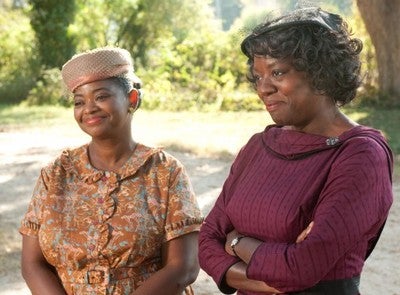
Like many of the educated, accomplished Black women of my generation (Gen X b. 1964-1977), I went to see the new movie “the Help” with deeply mixed emotions. Mixed, because my paternal grandmother was a maid all of her life, only she lived in the Northeast not the Deep South.
Mixed, because I love actress Viola Davis and always try to support films starring Black actors, but I was somewhat miffed that in the year 2011, in the Age of First Lady Michelle Obama, that such an acting talent was playing a worn and weary Jim Crow era Maid from Mississippi.
VIDEO: Mary J. Blige’s ‘Living Proof’ from ‘The Help’
Mixed, because yet another of our stories as Black women was being told by a well-meaning White person, who was an observer of our reality, versus having actually lived that reality.
However, when I left the movie, I came out with a different perspective. This is not a movie review. Instead, my goal here is to dissect some of the very important themes from that sullied period in America’s racial history that may still apply to us as Black and White women in real time, 21st century America.
Let’s be candid. The relationship between Black and White women in America has always been complicated. It is a relationship born out of slavery, where Black women were stripped of their femininity, their womanhood, and were forced to take care of, nurture, cook for, and care for their White female “mistresses” and their children.
Many times slave women who had just birthed their own children, nursed White babies from their own breast. This relationship between slave woman and slave mistress was further complicated by the role of White men, who often raped, or coerced slave women into sexual relationships right in front of their wives.
REAL TALK: In Defense of ‘The Help’
Former slave Harriet Jacobs writes about the oft strained slave and mistress relationship in her book “Incidents in the Life of a Slave Girl.” Jacobs presents a stirring firsthand account of how slavery left intense resentment and embarrassment for White mistresses who had to stand by and watch their husband’s flagrant and open abuse of slave women.
She says that White women were forced to find their dignity in the degradation of Black women. Author Dolens Perkins-Valdez, who penned the new best-selling novel “Wench,” also writes about the complexities of the master-slave relationship in the early 1850s, where southern slaveholders vacationed with their “wenches” (female slaves) on what we now know as Wilberforce University.
Fast forward through the murky waters of Jim Crow, post Reconstruction and Black women became domestics for rich and middle-class White women. Again, the relationship was one of Black women caring for White women, their children, their homes, and as is depicted in the movie “the Help,” often took care of these women physically and emotionally.
PHOTOS: ‘The Help’s’ Hollywood Premiere
This is important to grasp because these relationships were rarely reciprocal or nurturing for Black women, who could be fired on a whim after years of devoted service to families, or worse.
The question that we as modern women must grapple with now, however, is despite all of the advancements of the Civil Rights era, women’s equality and the like-what is the true state of relations between Black and White women?
How many of us can say we have close White girlfriends if we are Black women, or vice versa?
How well do Black women and White women collaborate in business or in the workplace? Do we help one another, share core values or no? Are Black women still viewed in a submissive, subservient role to their White female counterparts despite their achievements?
Viola Davis Gets Ready to Adopt a Baby
How about in relationships, do Black women resent White women who now can openly marry and be with Black men? How do White women feel when the Wall Street Journal openly suggests that Black women should turn to White men to solve their dismal relationship/marriage gap problem.
Get my point?
All of the challenges that beset us in the 19th and 20th century, still exist they are just dressed up nicely and we don’t deal with these questions because it is uncomfortable.
Viola Davis Says Black Women Will Be Satisfied with ‘The Help’
To me, the real rich and fruitful dialogue that we are missing is what this movie “the Help” should spark in us and that is how far has the “sisterhood” truly come between White and Black women in America.
I would tell you as a Black woman who just wrote her own book on dispelling the myths about and redefining the images of Black women in America that we still have a long way to go. Our voices as Black women, telling our own stories, modern day stories are still often muted, or dismissed as not “mainstream” enough or not “relevant” enough to share with the American family.
Unlike some of my peers Melissa Harris Perry, Valorie Boyd, Martha Southgate all who railed on the Stockett and found the movie to be distasteful, and ahistorical at best; I found the movie to be one that should cause White and Black women to find the courage to explore the state of our sisterhood with one another, and to help us finally put to rest the strain beneath the surface that still is a byproduct of the Jim Crow era of which Stockett so eloquently and tastefully writes.
Sophia A. Nelson, Esquire is a journalist and author of the new non-fiction book, “Black Woman Redefined: Dispelling Myths and Discovering Fulfillment in the Age of Michelle Obama (Benbella May 2011). Sophiaredefined@gmail.com
